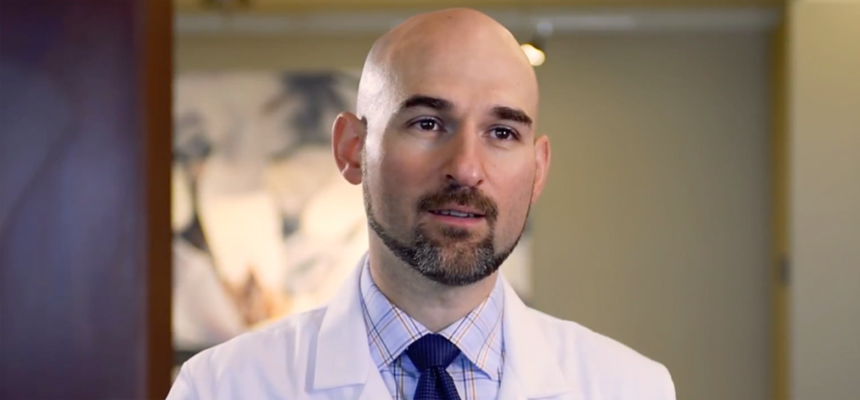

The best part of this cardiologist’s job? Giving patients a second chance.


For our latest installment of Making the Rounds, we chatted with Dr. Andrew Kolodziej, a cardiologist at the UK Gill Heart & Vascular Institute who specializes in advanced heart failure, heart transplant and pulmonary hypertension.
What kinds of conditions do you treat?
I usually see patients who have heart failure and who require additional medicines to keep them going. Oftentimes, patients are referred to me after their doctors have exhausted all their means of treatment.
I also see pulmonary hypertension patients – patients with elevated pressures in the vessels of the lungs. Blood vessels in your lungs have a separate physiology and respond to different stresses in their own way. And ultimately that condition can result in heart failure. Hence my interest in both conditions, because they often go hand-in-hand.
When did you decide to pursue a career in medicine?
This really goes back to my junior high school years. There was a dramatic moment in my life where I was hit by a car crossing the street. I ended up in the emergency room, and luckily, nothing major happened to me. But the paramedics that literally picked me up off the ground made an impact on my life going forward.
That experience really interested me in taking care of patients, specifically in emergency medicine and critical-care situations – really sick patients. I became an emergency medical technician and then graduated to a paramedic position, which was always a stepping stone to something more. Ultimately, that was medical school.
When I went to medical school, I went toward cardiology. Heart doctors always get asked why we picked cardiology specifically. It’s partly the heart being the core and the soul of any human being, as well as the fact that the patient population is generally really sick. That really interested me.
How would you describe your patient-care philosophy?
Being a patient myself sort of put things in perspective for me. Approaching patients, I see myself in their position. I see my family in their position. And ultimately, it goes for all of my colleagues in the cardiology department: We approach our patients as part of our family.
Our patient population is very sick, and they stay with us for a long time. Hopefully we get to do something for their heart, either with a left ventricular assist device (LVAD) – which is a device that replaces the function of a failing heart – or through heart transplant. Our patients stay with us for a long time, and I really get a chance to be a part of their family. I think that’s what makes me who I am.
What’s the best part of your job?
The best part of my job is to take somebody who is essentially dying and giving them a second chance at life. When a patient gets an LVAD or a transplant and they’re discharged home, and then they get to walk their daughter down the aisle – that’s what makes me move forward. It’s the best part of what I do.
How do you spend your time away from work?
I do a lot of endurance sports. I’m actually a triathlete. I haven’t done too many official events, but that is really my hobby.
Living in Lexington, if you get out running, and if you run for two or three hours, it’s just so beautiful out there. Same thing goes for bike riding. You can go up to Richmond and back and make that 60-mile ride. It’s so beautiful, and it passes by so quickly. I was on a ride once, and there were a couple of young horses that just started racing with us. It was great.
What’s your favorite food?
I’m vegan, so I’ll try anything that is vegan. You can explore lots of different foods, and it’s as healthy as it can get. And there’s so many vegan options now and so much interest in it that people will make vegan food that tastes like meat. It literally looks and tastes look “regular food.” But it’s so much healthier, so you don’t feel guilty.
Check out our video interview with Dr. Kolodziej, where he tells us more about what makes the care teams at UK HealthCare so special.






